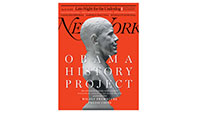 |
1. In last week’s issue, New York asked 53 historians to respond to a broad questionnaire about how President Obama will be viewed by history (“Barack Obama: The [Trifle Early] Historical Verdict,” January 12–25). Commenters responded through their own political lenses, criticizing historians’ predictions and adding their own. “If the ACA survives SCOTUS, it will be a real shift in social policy as durable as welfare reform or as Reagan’s tax cuts,” said the Dish’s Andrew Sullivan, who called Jonathan Chait’s argument for Obama’s significance “brilliantly argued.” Others agreed that health-care reform would be central to Obama’s legacy. “It is a fool’s errand to predict the future ratings of a current president,” wrote commenter Artyqueens, before venturing his own guess: “Health care will be seen as his most significant accomplishment but also the event which made an FDR-type moment disintegrate.” Author Chuck Klosterman summed it up well: “These ballots are pretty interesting & wildly personal,” he tweeted. “Historians make weird futurists.”
2. “I didn’t understand how network television, the one-size-fits-all antithesis to Fresh Off the Boat, was going to house the voice of a futuristic Chinkstronaut. I began to regret ever selling the book,” wrote Eddie Huang. In his account of converting his memoir into a sitcom, Huang argued that despite his dissatisfaction with the final result, he was pleased to help more Asian-American stories get on television (“Bamboo-Ceiling TV,” January 12–25). Some readers were less convinced: “Eddie. Why?” wrote radzfman. “Why are you trying to sell yourself to white bread America?” “Not surprisingly, it’s a headache to try to get your story as a minority represented in an authentic way rather than a watered-down version loaded with racial stereotypes,” wrote The Muse’s Clover Hope. Dude19 agreed: “How many shows on broadcast television aren’t watered down and commercialized for a mass audience? The problem here is that he wanted to make a cable show on broadcast.” GotMySlingShot was more sympathetic to Huang’s point, saying, “Even a bland TV sitcom about an Asian family dealing with racial and cultural issues is better than nothing at all. But at the same time, it’s a disappointing alternative.” Huang later explained his rationale for writing the story in an interview with NPR. “I want to encourage criticism,” he said. “When the markets are explicit about what they want and how they want to be represented and not represented, the studio and network will acquiesce. They’re not on a mission to not represent us. They just don’t know how to.”
3. “Campbell Brown has transformed herself from a TV journalist to a hero reformer for the teacher-tenure-busting crowd,” wrote Vanessa Grigoriadis in her story on “the most controversial woman in school reform” (“Brown v. … ,” January 12–25). Commenters wondered what an appropriate alternative to tenure might be. “People who say ‘pay them more money’ to replace tenure at least have a plan,” wrote tonyx3. “But they’ve obviously never been to a public school board meeting … at any reasonably sized school, this will blow a hole in the budget.” Commenter Cinclow20 pointed out why older teachers are “disproportionately the problems”: “burnout and the onset of disillusionment in a system that’s very difficult to navigate over the long term, what with having to deal with often severe social problems, lack of proper support, the ‘supervision’ of often unqualified principals and supervisors, and the constantly changing methodologies and mandates.” Cinclow20 also criticized reformers who “suck the students from motivated families out of the general population, put them into charter schools, and pretend that by eliminating tenure, and applying market-based performance compensation systems to teacher pay, they’ve fundamentally solved the problem. While this may work for the small number of students in these charter schools, let’s not pretend that it’s anything more than segregation by motivation rather than race. It may be that doing this will result in those chosen few getting the education they deserve, and that may justify it; but it will do nothing good for the vast majority of students who remain in the public system.”